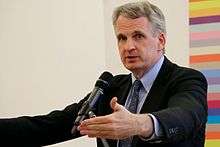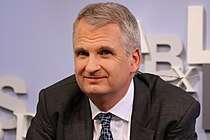Timothy D. Snyder
Timothy David Snyder (born August 18, 1969) is an American author and historian specializing in the history of Central and Eastern Europe, and the Holocaust. He is the Richard C. Levin Professor of History at Yale University and a Permanent Fellow at the Institute for Human Sciences in Vienna.[2]
Timothy D. Snyder | |
|---|---|
 Snyder in 2016 at Imre Kertész Kolleg Jena | |
| Born | Timothy David Snyder August 18, 1969 Ohio, United States |
| Spouse(s) | |
| Children | 2 |
| Awards | American Historical Association's George Louis Beer Award (2003),[1] Hannah Arendt Prize (2013), The VIZE 97 Prize (2015) |
| Academic background | |
| Alma mater | |
| Academic work | |
| Sub-discipline | History of Eastern Europe |
| Institutions |
|
Snyder is a member of the Council on Foreign Relations and the Committee on Conscience of the United States Holocaust Memorial Museum.
Early life and education
Snyder was born on August 18, 1969,[3] in southwestern Ohio, the son of Christine Hadley Snyder, a teacher, accountant, and homemaker, and Estel Eugene Snyder, a veterinarian.[4] Snyder graduated from Centerville High School. He received his Bachelor of Arts degree in history and political science from Brown University and his Doctor of Philosophy degree in modern history in 1995 at the University of Oxford, supervised by Timothy Garton Ash and Jerzy Jedlicki. He was a Marshall Scholar at Balliol College, Oxford, from 1991 to 1994.[5]
Career
Snyder has held fellowships at the Centre national de la recherche scientifique in Paris from 1994 to 1995, the Institut für die Wissenschaften vom Menschen in Vienna in 1996, the Olin Institute for Strategic Studies at Harvard University in 1997, and was an Academy Scholar at the Weatherhead Center for International Affairs at Harvard University from 1998 to 2001.
He has also been an instructor at the College of Europe Natolin Campus, the Baron Velge Chair at the Université libre de Bruxelles, the Cleveringa Chair at the University of Leiden, Philippe Romain Chair at the London School of Economics, and the 2013 René Girard Lecturer at Stanford University.[6][7][8] Prior to assuming the Richard C. Levin Professorship of History, Snyder was the Bird White Housum Professor of History at Yale University.
Snyder can speak and write French, German, Polish, and Ukrainian in addition to English, and read Czech, Slovak, Russian, and Belarusian. He is a member of the Committee on Conscience of the United States Holocaust Memorial Museum.[9]
Work
Snyder has written five books and co-edited two. One of the latter, Thinking the Twentieth Century (2012), was written with Tony Judt while Judt was in the late stages of his illness with ALS disease.[10]
Snyder has published essays in publications such as the International Herald Tribune, The Nation, New York Review of Books,[11] the Times Literary Supplement, The New Republic, Eurozine, Tygodnik Powszechny, the Chicago Tribune, and the Christian Science Monitor.
Snyder says that he has a reading and/or speaking knowledge of eleven European languages. This enabled him to use primary and archival sources in Germany and Central Europe in researching his book, Bloodlands: Europe Between Hitler and Stalin (2010). Bloodlands got a positive reception.[12]
Snyder says that knowing other languages is very important:
If you don't know Russian, you don't really know what you're missing. ... We can only see as much, and we can only go as far as our languages take us. I wrote this book in English, but there are very important conversations that are happening in German, Russian, Polish and so on among those historians, and the book is addressed to all of them.[13]
 | |
Bloodlands has been translated into 20 languages.[14]
Snyder published Black Earth in 2015. The book received mixed reviews, with several harsh reviews.[12]
Snyder is a member of the Committee on Conscience of the United States Holocaust Memorial Museum. He serves on the editorial boards of the Journal of Modern European History and East European Politics and Societies.[14]
For the academic year 2013–2014, he held the Philippe Roman Chair of International History at the London School of Economics and Political Science.[15]
Views on Putin
In The Road to Unfreedom, Snyder argues that Vladimir Putin's regime in Russia is authoritarian, and that it uses fascist ideas in its rhetoric.[16] In December 2018, during a discussion with a fellow historian of Eastern Europe, John Connelly, Snyder referred to this as schizo-fascism:
...fascist ideas have come to Russia at a historical moment, three generations after the Second World War, when it’s impossible for Russians to think of themselves as fascist. The entire meaning of the war in Soviet education was as an anti-fascist struggle, where the Russians are on the side of the good and the fascists are the enemy. So there’s this odd business, which I call in the book “schizo-fascism,” where people who are themselves unambiguously fascists refer to others as fascists.[17]
His view was questioned by Marlene Laruelle, Research Professor at The George Washington University: "Contrary to [Snyder's] claims, the Kremlin does not live in an ideological world inspired by Nazi Germany, but in one in which the Yalta decades, the Gorbachev-Yeltsin years, and the collapse of the Soviet Union still constitute the main historical referents and traumas."[18] Laruelle accused Snyder of "distortions, inaccuracies, and selective interpretations."[12]
Views on the Trump administration
Asked how the agenda of the Trump administration compared with the Adolf Hitler's rise to power, Snyder said that:
[H]istory does not repeat. But it does offer us examples and patterns, and thereby enlarges our imaginations and creates more possibilities for anticipation and resistance.[19]
In a May 2017 interview with Salon, Snyder warned that the Trump administration would attempt to subvert democracy by declaring a state of emergency and take full control of the government, similar to Hitler's Reichstag fire: "it’s pretty much inevitable that they will try."[20] According to Snyder, "Trump's campaign for president of the United States was basically a Russian operation." He also warned that his lies would lead to tyranny.[21]
Teaching
Snyder teaches a two-part lecture course at Yale covering the history of Eastern Europe pre- and post-1914, a critical turning point in world affairs. In the past he has also taught an undergraduate seminar on communism in Eastern Europe.[22]
Personal life
Since 2005, Snyder has been married to Marci Shore, a professor of European cultural and intellectual history at Yale University. They have two children together.[23] He speaks five and reads ten European languages.[24]
In December 2019, he fell gravely ill. While recuperating through the coronavirus pandemic, he was moved to write Our Malady, about the US coronavirus response so far.
Awards
- 2017 Prize of the Foundation for Polish Science,[25] the highest scientific honour in Poland
- 2015 The VIZE 97 Prize from the Václav Havel Foundation[26]
- 2015 Carnegie Fellowship[27]
- 2014 Antonovych prize[27]
- 2013 Hannah Arendt Prize for Political Thought[28] for Bloodlands: Europe Between Hitler and Stalin (Basic Books, 2010)
- 2012 Prakhin International Literary Award The Truth About Holocaust & Stalinist Repression for Bloodlands: Europe Between Hitler and Stalin (Basic Books, 2010)[29]
- 2012 Kazimierz Moczarski Historic Award for Bloodlands: Europe Between Hitler and Stalin[30]
- 2012 Leipzig Book Prize for European Understanding
- 2012 Literature Award from the American Academy of Arts and Letters[31]
- 2011 Ralph Waldo Emerson Award by the Phi Beta Kappa Society
- Lithuanian Diplomacy Star[27]
- Polish Bene Merito honorary badge,[27]
- Officer’s Cross of the Order of Merit of the Republic of Poland[27]
- Estonian Order of the Cross of Terra Mariana Class III.[27]
Selected works
- Nationalism, Marxism, and Modern Central Europe: A Biography of Kazimierz Kelles-Krauz (Harvard University Press, 1998).
- Wall Around the West: State Power and Immigration Controls in Europe and North America (Rowman and Littlefield, 2000). Co-edited with Peter Andreas.
- The Reconstruction of Nations: Poland, Ukraine, Lithuania, Belarus, 1569-1999 (Yale University Press, 2003)
- Sketches from a Secret War: A Polish Artist's Mission to Liberate Soviet Ukraine (Yale University Press, 2005)
- The Red Prince: The Secret Lives of a Habsburg Archduke (Basic Books, 2008)
- Bloodlands: Europe Between Hitler and Stalin (Basic Books, 2010)
- Thinking the Twentieth Century With Tony Judt. (Penguin, 2012)
- Black Earth: The Holocaust as History and Warning (Penguin, 2015)
- On Tyranny: Twenty Lessons from the Twentieth Century (Penguin, 2017) ISBN 978-0804190114
- The Road to Unfreedom: Russia, Europe, America (Penguin, 2018)
- Our Malady: Lessons in Liberty from a Hospital Diary (Penguin, 2020)
References
- George Louis Beer Prize American Historical Association (homepage), Retrieved November 30, 2012
- Ian Kershaw and Timothy Snyder to be honoured with Leipzig Book Prize for European Understanding 2012 Leipzig.de, January 16, 2012 Archived March 5, 2012, at the Wayback Machine
- "Library of Congress Authorities". LCNAF Cataloging in Publication data - LC Control Number: no 98080445. LOC. Retrieved January 22, 2010.
- ""Estel Eugene Snyder and Christine Hadley Snyder"". Google Books. Retrieved April 16, 2017.
- "Timothy Snyder Receives 2011 Ralph Waldo Emerson Award", The Phi Beta Kappa Society, 05 December 2011
- ""Professor Timothy Snyder"". Yale University. Retrieved July 30, 2017.
- ""Timothy Snyder, author of Bloodlands, to speak at Stanford on March 13"". Stanford University. Retrieved July 30, 2017.
- ""Timothy Snyder"". London School of Economics. Retrieved July 30, 2017.
- ""Professor Timothy Snyder"". Yale University. Retrieved July 30, 2017.
- "The Liveliest Mind in New York". New York.
- List of articles by Snyder in The New York Review of Books
- "The Bleak Prophecy of Timothy Snyder". The Chronicle of Higher Education. 2019-04-12. Retrieved 2019-04-16.
- "Timothy Snyder, interviewed by 'Prospero', The Economist (Books), June 2011
- "Best-selling author, historian Timothy Snyder to deliver W. Bruce Lincoln lecture Sept. 19", Northern Illinois University; retrieved October 3, 2012
- "Timothy Snyder - Individual Bios - People - IDEAS - Home". Lse.ac.uk. Retrieved 2014-03-05.
- "The Road to Unfreedom by Timothy Snyder | PenguinRandomHouse.com: Books". PenguinRandomhouse.com. Retrieved 2019-01-14.
- "Public Thinker: Timothy Snyder on Russia and "Dark Globalization"". Public Books. December 7, 2018.
- "Is Russia Really "Fascist"? A Comment on Timothy Snyder". PONARS Eurasia.
- Snyder, Timothy (February 7, 2017). "We have at most a year to defend American democracy, perhaps less" (Interview). Matthias Kolb. Süddeutsche Zeitung. Retrieved February 28, 2017.
- Devega, Chauncey (May 1, 2017). "Historian Timothy Snyder: "It's pretty much inevitable" that Trump will try to stage a coup and overthrow democracy". Salon. Retrieved May 1, 2017.
- "Historian Timothy Snyder: Trump's lies are creeping tyranny". Vox. May 22, 2017.
- "History: Lecture Courses". Yale University. 2016. Retrieved February 27, 2017.
- Marriage announcement in Lehigh Valley Morning Call, February 13, 2005
- History for the Future (Історія для майбутнього). Ukrayina Moloda. 26 June 2015
- "FNP Prize ceremony". Foundation for Polish Science.
- "Dagmar Havlova Presents 17th VIZE Award to Historian Timothy Snyder in Prague". American Friends of the Czech Republic. October 5, 2015. Retrieved July 30, 2017.
- "Timothy Snyder". Timothy Snyder. Retrieved July 30, 2017.
- "Literatur: US-Professor Timothy Snyder erhält Hannah-Arendt-Preis - Bremen" (in German). Focus.de. 22 August 2013. Retrieved 2014-03-05.
- "The Truth about Holocaust & Stalinist Repression Winners". prakhin.org. 2014-01-26. Retrieved 2014-03-05.
- "Nagroda Moczarskiego". nagrodamoczarskiego.pl. Retrieved 2020-03-08.
- "Snyder book honored by American Academy of Arts and Letters". Yale University. March 16, 2012. Retrieved July 30, 2017.
External links
| Wikiquote has quotations related to: Timothy D. Snyder |
- Official Youtube channel
- Yale University faculty page
- List of articles by Snyder in Eurozine
- "Hitler and Stalin - The Q&A: Timothy Snyder, historian". The Economist. 3 June 2011.
- On Tyranny: Yale Historian Timothy Snyder on How the U.S. Can Avoid Sliding into Authoritarianism. Interview with Democracy Now! May 30, 2017.
- Yale Historian Warns About the Rise of Tyranny in the US. Interview on Amanpour & Company February 18, 2020
.jpg)